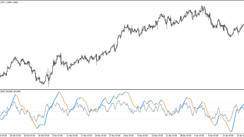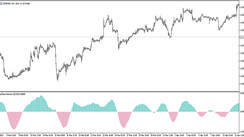The Significance of the British Pound in Forex Trading
The British pound sterling (GBP), boasting a remarkable heritage, has secured its place as one of the most frequently traded currencies on the forex market. This prominence stems not only from its status as the UK's official currency, but also from the fact that London serves as one of the globe's preeminent forex trading hubs.
Newcomers to forex trading often select the GBP as one of their primary trading currencies, due in large part to its popularity and the availability of data and reports. For those who base their trades on economic fundamentals - key economic indicators and news events - knowing the most impactful reports for the GBP is vital for efficient research and strategic focus.
In this guide, we will spotlight some pivotal economic reports that will be beneficial for novice traders in their exploration of GBP-related trading.
Decoding the GBP: Key Insights
Among the top traded currencies worldwide, the GBP holds the fourth position. The UK's economic stature, being one of the largest economies globally, significantly contributes to this. The importance of thorough understanding of the factors that influence its value is imperative for any forex trader.
Fundamental traders, who rely on data from economic reports and news events for their trading decisions, pay particular attention to several key financial and economic reports from the UK. These reports primarily cover five sectors: (1) prices and inflation, (2) monetary policy, (3) market confidence and sentiment, (4) GDP/economic growth, and (5) the balance of payments.
A Deep Dive into Five Core Sectors
Before proceeding, it's important to acknowledge that the value of currencies across various nations is generally influenced by the same core economic indicators. These include: monetary policy, price inflation, market confidence and sentiment, economic growth (GDP), and balance of payments. These five factors can serve as a blueprint to identify crucial reports and construct a holistic view of any currency’s potential direction.
Price Fluctuations and Inflation
Key Reports: CPI, PPI
The first major factors, price and inflation, hold a significant position in the GBP's value determination. Typically, countries experiencing higher inflation rates than others will observe a comparative depreciation in their currency value. Furthermore, inflation often triggers central bank intervention, like interest rate adjustments, to curb undesirable impacts.
To track inflation trends in the UK, traders usually monitor the Consumer Price Index (CPI), a key indicator compiled by the Office for National Statistics. The CPI measures the price changes of consumer goods and services within a specified period. Its significance is amplified by the fact that the Bank of England (BOE) utilizes it for its inflation target. Consequently, any CPI deviation from the BOE's target could indicate potential future changes in monetary policy that could substantially impact the GBP.
Additionally, the Producer's Price Index (PPI) is another crucial report. This indicator often acts as an early warning system for inflation, capturing price shifts at the raw material level that may eventually reach the consumer level, as reflected in the CPI. Given that the PPI report is typically released ahead of the CPI, it should be analyzed in conjunction with the latter for a comprehensive picture.
Monetary Policy
Key Reports: Bank Rate, BOE Inflation Report
Monetary policy formulated by the Bank of England (BOE) is a critical element to consider. One of the BOE's central mandates is to encourage monetary stability, defined as "low inflation and confidence in the currency."
When the BOE perceives inflation levels threatening the stability of the pound, it employs monetary policy tools to manage inflation. It's the timing of these monetary policies, such as interest rate changes, that traders strive to anticipate.
Traders often track changes in the bank rate, the interest rate charged by banks on balances held at the BOE, to keep abreast of monetary policy. This rate is determined monthly by the Monetary Policy Committee (MPC), and its decisions are made public on the Bank of England's website.
Confidence and Market Sentiment
Key Report: Gfk Consumer Confidence
Surveys measuring market sentiment play a crucial role for fundamental traders. Reports on UK market confidence and sentiment are vital, as traders need to understand whether people are generally optimistic or pessimistic about the economy. Any change in sentiment, or the degree of such change, can indicate shifts in the underlying economy and, in turn, impact the GBP.
The Gfk Consumer Confidence report, which reflects respondents' perspectives on past events and future expectations, is frequently used by traders to gauge sentiment towards the UK economy's direction.
Economic Growth and GDP
Key Reports: Manufacturing and Production, Index of Services, Retail Sales, GDP
The overall economic activity level in the UK, primarily represented by the Gross Domestic Product (GDP), is another pivotal factor that can influence currency values. Traders need to stay aware of three different GDP reports - Preliminary GDP, Revised GDP, and Final GDP - as each provides distinct insights into the UK's economic health. The Preliminary GDP estimate, being the earliest release, usually has the most significant impact despite being the least accurate of the three.
Given that GDP is reported quarterly, traders often supplement it with more frequent indicators like retail sales, manufacturing and production, and the index of services. Among these, retail sales are often deemed the most important, given that consumers are widely considered the primary drivers of economic activity.
Balance of Payments
Key Reports: International Trade, Balance of Payments
Finally, a country's balance of payments (BoP) - the accounting record of a nation's financial interaction with the rest of the world - is significant. Forex traders generally focus on the current account, which reflects a country's import/export activity, income payments, and transfer payments. A current account surplus usually indicates a positive impact on the currency, as it suggests more capital is entering than leaving the currency, with the reverse being true for a deficit.
It's important to note that while the trade balance report is issued monthly, the current account is disclosed quarterly. For import/export data alone, the trade balance is the more suitable report.
Forex Trading Facts: A Quick Overview
As of now, the Kuwaiti dinar is the world's strongest currency, underpinned by the nation's robust oil reserves. On the flip side, the Iranian rial is the weakest currency, largely due to sanctions linked to Iran's alleged support of organizations deemed as terrorist groups by the U.S.
In terms of the UK's GDP, the services sector takes the lead, contributing to 82% of the output in 2021. As for the British pound, it's not backed by any specific asset, such as gold. Like most other currencies, it is a fiat currency, and its value is determined by the interplay of supply and demand.
The Bottom Line
The sterling pound's valuation is affected by a myriad of economic indicators. Recognizing which reports to utilize is the initial step. The more challenging part is interpreting and combining these reports to formulate a trading direction. However, if you are new to forex trading and seek to ground your GBP trades in fundamental reports, these five core areas provide an excellent starting point.





